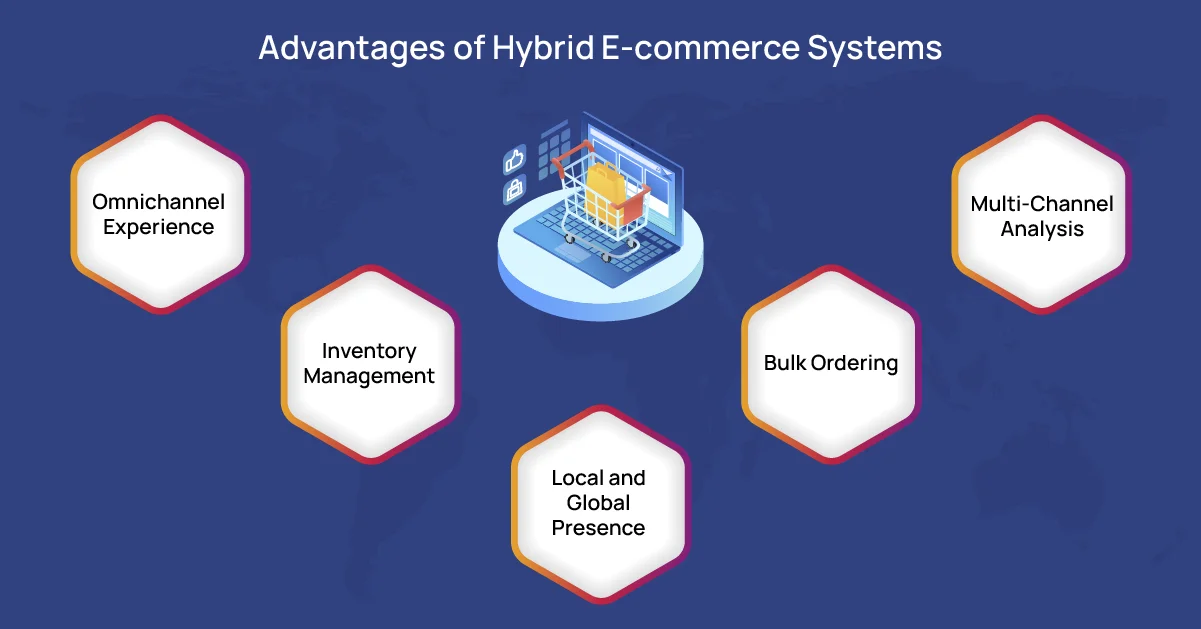For customers today, shopping isn't just about scrolling online or strolling through store aisles, it's a blend of both. That's where the hybrid ecommerce system comes in, where the convenience of online shopping blends with the hands-on experience of physical stores.
A hybrid approach in e-commerce combines regular stores with websites or apps and quick delivery services. For example, Buy Online, Pickup In-Store (BOPIS) lets you buy things online and grab them at a nearby store.
Hybrid e-commerce systems aren't just good for customers, they're good for business too. By combining their online and physical resources smartly, businesses can diversify sales channels, enhance customer experience, reduce cost, and accelerate growth. Moreover, a hybrid model allows retailers to perfectly balance their wider online reach with the trustworthiness of a physical store.
This helps in offering audiences better deals and convenient options like picking up online orders from a nearby store without paying extra for shipping. While this may sound similar to omnichannel marketing, there are some subtle differences between the two.
This Article Contains:
What is Hybrid ecommerce?
Hybrid ecommerce is a business model that combines online and traditional offline retail services to offer a more convenient shopping experience for customers. A successful hybrid model demands effective coordination between online storefront and physical store to adapt to the changing consumer behaviors and market dynamics.
What is omnichannel marketing?
Omnichannel marketing is a unified marketing strategy that integrates all the channels to create a consistent experience across multiple touchpoints. Effective omnichannel marketing enhances customer satisfaction, improves brand loyalty, and accelerates business growth.
What Are the Differences Between Omnichannel Marketing and Hybrid E-commerce Systems
Advantages of Hybrid E-commerce Systems
In the world of online shopping, the rise of hybrid e-commerce systems is helping stores expand. These systems offer various benefits that align with both current and future trends in online retail.

1. Omnichannel Experience
In a hybrid e-commerce setup, the omnichannel experience is like connecting all the dots for customers. It's not just about having online shopping, mobile apps, and physical stores, it's about making everything work together seamlessly.
Imagine your customers checking out products on their phones, getting suggestions based on what they like, and then finding those same suggestions when they visit a real store. This way, businesses ensure you get a consistent and smooth experience, no matter how customers choose to shop. It's all about making customers happy and keeping them loyal to the brand.
2. Inventory Management
One of the important hybrid e-commerce systems benefits is efficient inventory management. Hybrid systems enable better control over inventory by seamlessly integrating online and offline stock, helping businesses optimize stock levels and prevent overstock or stockouts. It's like having a solid system in place to ensure you have the right products available and customers can find them easily.
3. Local and Global Presence
When businesses have both a local store and an online presence, it's like having a shop that's open 24/7. The local store is great for people who enjoy the traditional way of shopping, where they can see and touch things before buying. On the other hand, the online part is perfect for those who prefer shopping from the comfort of their home, anytime they want. Through this people can discover and buy from the business, whether they're early birds at the local shop or night owls browsing online.
4. Bulk Ordering
In a hybrid ecommerce system, bulk ordering becomes a breeze for customers. Whether they're shopping online or in-store, this setup allows businesses to offer convenient options for buying in larger quantities. For those who prefer the ease of clicking online, they can quickly add items in bulk to their digital cart.
Similarly, customers visiting physical stores can easily pick up larger quantities of products. This flexibility in ordering in bulk caters to the needs of various customers, whether they're businesses stocking up or individuals looking for more cost-effective shopping solutions. It's like having the convenience of a warehouse at your fingertips, no matter if you're clicking or walking in.
5. Multi-Channel Analysis
In today's digital age, businesses often sell their products or services through various online platforms, such as websites, social media, and mobile apps. Hybrid ecommerce platforms make it easy for companies to analyze how well they're doing across all these different channels. Imagine it like looking at a big puzzle where each piece represents a different way customers can buy from you.
These platforms help businesses see the whole picture by putting together all the pieces, making it simpler to understand how much they're selling and what customers are doing on each platform. It's like having a full view of your business performance, helping you make smart decisions to improve sales and better serve your customers.
Conclusion
Hybrid e-commerce systems offer enhanced customer satisfaction through seamless shopping experiences, optimized inventory management, and extended local and global presence. They also provide streamlined bulk ordering options and efficient multi-channel analysis, contributing to improved business performance. They provide preferences, and reduce out-of-stock issues, benefitting both shoppers and businesses.
Adaptable and tech-savvy, these systems provide personalized, efficient shopping journeys, connecting people to what they need, where, and how they want it for an enjoyable retail experience. Here, Mayura Consultancy Services can be your reliable partner to help you harness the full potential of hybrid e-commerce solutions.
FAQs
1. How does a Hybrid E-commerce System enhance customer satisfaction?
In a Hybrid E-commerce System, customers enjoy a seamless shopping experience that integrates both online and offline channels. This ensures consistency in product information, suggestions, and overall service, fostering customer satisfaction and loyalty.
2. How does a Hybrid E-commerce System address inventory management challenges?
Hybrid E-commerce Systems facilitate efficient inventory management by seamlessly integrating online and offline stock. This integration allows businesses to optimize stock levels, preventing issues such as overstock or stockouts, and ensuring that customers can always find what they're looking for.
3. What advantages does a Hybrid Ecommerce System offer in terms of global and local presence?
A Hybrid E-commerce System provides businesses with a 24/7 presence through both local physical stores and online platforms. This dual presence caters to diverse customer preferences, accommodating those who enjoy traditional in-store experiences as well as those who prefer the convenience of online shopping, thereby expanding the business's reach locally and globally.






